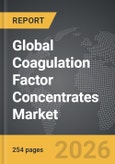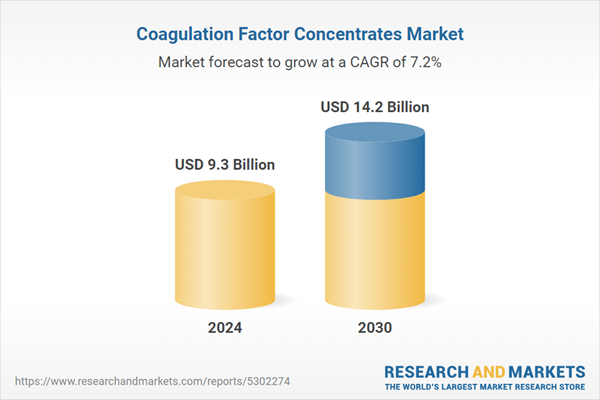Global Coagulation Factor Concentrates Market - Key Trends and Drivers Summarized
What Are Coagulation Factor Concentrates and How Do They Work?
Coagulation factor concentrates are specialized therapeutic products that play a critical role in the management of hemophilia and other bleeding disorders. These concentrates are formulated to replace missing or deficient clotting factors in individuals with coagulation disorders, thereby restoring the normal blood clotting process. The human coagulation cascade involves a complex series of interactions between various clotting factors, such as Factor VIII and Factor IX, which work together to form a stable blood clot at the site of a blood vessel injury. In patients with conditions like hemophilia A and B, these factors are either deficient or dysfunctional, leading to prolonged bleeding episodes that can result in severe complications. Coagulation factor concentrates can be derived from human plasma or manufactured using recombinant DNA technology. Plasma-derived concentrates are extracted and purified from donated blood, while recombinant products are synthetically engineered in laboratory settings, reducing the risk of blood-borne infections. Once administered intravenously, these concentrates quickly elevate the patient's factor levels to therapeutic concentrations, promoting effective clot formation and reducing bleeding risks. Over time, advancements in production methods have improved the safety, efficacy, and ease of administration of these life-saving products, making them an essential component in modern hemophilia care.Why Are Coagulation Factor Concentrates Considered a Breakthrough in Treating Hemophilia and Bleeding Disorders?
Coagulation factor concentrates represent a major breakthrough in the treatment of hemophilia and other bleeding disorders due to their ability to prevent and control bleeding episodes with precision and reliability. Before the introduction of factor concentrates, patients relied on whole blood transfusions or plasma infusions, which were less effective and carried a higher risk of viral transmission and immunogenic complications. The advent of factor concentrates has dramatically improved patient outcomes by enabling on-demand and prophylactic (preventive) treatment approaches. On-demand treatment involves administering concentrates at the first sign of bleeding to quickly stop the episode, while prophylactic regimens involve regular infusions to maintain clotting factor levels, thereby preventing spontaneous bleeds and protecting against joint damage, which is a common complication in hemophilia patients. Prophylactic therapy has been shown to significantly enhance the quality of life for patients, allowing them to engage in normal daily activities with reduced fear of bleeding. Additionally, newer generations of coagulation factor concentrates, such as extended half-life (EHL) products, have been developed to stay in the bloodstream longer, reducing the frequency of infusions needed and improving patient compliance. The availability of these products has revolutionized the management of hemophilia, transforming it from a life-threatening condition to a manageable chronic disease.How Are Emerging Technologies and Research Advancing Coagulation Factor Concentrates?
Recent advancements in biotechnology and pharmaceutical research are pushing the boundaries of what is possible with coagulation factor concentrates, leading to safer, more effective, and longer-lasting treatment options. One major area of innovation is the development of extended half-life (EHL) coagulation factors, which are engineered to remain active in the bloodstream for longer periods. This is achieved through modifications such as PEGylation (attachment of polyethylene glycol molecules) or fusion with the Fc region of immunoglobulins, which delay the body's natural clearance of the factor. As a result, patients require fewer infusions, reducing the treatment burden and enhancing adherence. Another significant breakthrough is the rise of recombinant products that are produced without the use of animal or human proteins, virtually eliminating the risk of contamination and adverse immune reactions. These products are not only safer but also more consistent in quality and efficacy. Gene therapy is an emerging frontier that promises to reshape the entire landscape of hemophilia treatment. Experimental gene therapies aim to introduce functional copies of the defective genes responsible for hemophilia, potentially providing a one-time, curative solution by enabling the patient's own cells to produce the missing clotting factors. Early clinical trials have shown promising results, with sustained factor production and reduced bleeding rates in participants. Furthermore, innovative delivery mechanisms such as subcutaneous formulations and non-intravenous routes are under investigation, which could make treatment more accessible and less invasive.What Factors Are Fueling the Expansion of the Coagulation Factor Concentrates Market?
The growth in the coagulation factor concentrates market is driven by several factors, primarily the increasing prevalence of bleeding disorders, advancements in biotechnological manufacturing, and rising awareness of early diagnosis and prophylactic treatment strategies. One of the main growth drivers is the rising global incidence of hemophilia and other rare bleeding disorders, which necessitates effective and reliable treatment options. As diagnostic capabilities improve, more patients are being accurately diagnosed and treated, expanding the patient pool for coagulation factor concentrates. Another significant driver is the shift towards prophylactic treatment regimens, which require regular use of these concentrates to prevent bleeds rather than treating them reactively. This shift is increasing the overall demand for these products, particularly for newer, extended half-life versions that offer the convenience of less frequent dosing. Additionally, advancements in recombinant technology and gene therapy are driving innovation in the market, with pharmaceutical companies investing heavily in research and development to create safer and more effective products. The introduction of novel products that offer longer-lasting effects, fewer side effects, and improved safety profiles is attracting more patients and clinicians to adopt these newer treatments. Regulatory approvals and supportive government policies are also contributing to market growth, as they facilitate faster access to new therapies. For example, the FDA and EMA have been increasingly approving new factor concentrates, including those with extended half-lives and non-intravenous administration methods. Furthermore, the trend towards home-based care and self-administration is expanding the market, as patients seek greater independence and flexibility in managing their conditions. The rising investments in research aimed at improving the quality and durability of coagulation factor concentrates, combined with the potential for gene therapy to serve as a long-term solution, are expected to continue driving growth in this market, positioning it for sustained expansion in the years to come.Report Scope
The report analyzes the Coagulation Factor Concentrates market, presented in terms of market value (US$ Thousand). The analysis covers the key segments and geographic regions outlined below.- Segments: End-Use (Hospitals & Clinics, Clinical Research Laboratories, Academic Institutes).
- Geographic Regions/Countries:World; United States; Canada; Japan; China; Europe (France; Germany; Italy; United Kingdom; Spain; Russia; and Rest of Europe); Asia-Pacific (Australia; India; South Korea; and Rest of Asia-Pacific); Latin America (Argentina; Brazil; Mexico; and Rest of Latin America); Middle East (Iran; Israel; Saudi Arabia; United Arab Emirates; and Rest of Middle East); and Africa.
Key Insights:
- Market Growth: Understand the significant growth trajectory of the Hospitals & Clinics End-Use segment, which is expected to reach US$8.8 Billion by 2030 with a CAGR of a 7.2%. The Clinical Research Laboratories End-Use segment is also set to grow at 7.8% CAGR over the analysis period.
- Regional Analysis: Gain insights into the U.S. market, valued at $2.4 Billion in 2024, and China, forecasted to grow at an impressive 10.7% CAGR to reach $3.4 Billion by 2030. Discover growth trends in other key regions, including Japan, Canada, Germany, and the Asia-Pacific.
Why You Should Buy This Report:
- Detailed Market Analysis: Access a thorough analysis of the Global Coagulation Factor Concentrates Market, covering all major geographic regions and market segments.
- Competitive Insights: Get an overview of the competitive landscape, including the market presence of major players across different geographies.
- Future Trends and Drivers: Understand the key trends and drivers shaping the future of the Global Coagulation Factor Concentrates Market.
- Actionable Insights: Benefit from actionable insights that can help you identify new revenue opportunities and make strategic business decisions.
Key Questions Answered:
- How is the Global Coagulation Factor Concentrates Market expected to evolve by 2030?
- What are the main drivers and restraints affecting the market?
- Which market segments will grow the most over the forecast period?
- How will market shares for different regions and segments change by 2030?
- Who are the leading players in the market, and what are their prospects?
Report Features:
- Comprehensive Market Data: Independent analysis of annual sales and market forecasts in US$ Million from 2024 to 2030.
- In-Depth Regional Analysis: Detailed insights into key markets, including the U.S., China, Japan, Canada, Europe, Asia-Pacific, Latin America, Middle East, and Africa.
- Company Profiles: Coverage of players such as Bayer AG, Bio Products Laboratory Limited, Biotest AG, Coagulation Sciences, CSL Ltd. and more.
- Complimentary Updates: Receive free report updates for one year to keep you informed of the latest market developments.
Some of the 113 companies featured in this Coagulation Factor Concentrates market report include:
- Bayer AG
- Bio Products Laboratory Limited
- Biotest AG
- Coagulation Sciences
- CSL Ltd.
- FFF Enterprises, Inc.
- Gesan Production Srl
- Grifols International SA
- Guangzhou Wondfo Biotech Co., Ltd
- Japan Blood Products Organization
This edition integrates the latest global trade and economic shifts into comprehensive market analysis. Key updates include:
- Tariff and Trade Impact: Insights into global tariff negotiations across 180+ countries, with analysis of supply chain turbulence, sourcing disruptions, and geographic realignment. Special focus on 2025 as a pivotal year for trade tensions, including updated perspectives on the Trump-era tariffs.
- Adjusted Forecasts and Analytics: Revised global and regional market forecasts through 2030, incorporating tariff effects, economic uncertainty, and structural changes in globalization. Includes historical analysis from 2015 to 2023.
- Strategic Market Dynamics: Evaluation of revised market prospects, regional outlooks, and key economic indicators such as population and urbanization trends.
- Innovation & Technology Trends: Latest developments in product and process innovation, emerging technologies, and key industry drivers shaping the competitive landscape.
- Competitive Intelligence: Updated global market share estimates for 2025, competitive positioning of major players (Strong/Active/Niche/Trivial), and refined focus on leading global brands and core players.
- Expert Insight & Commentary: Strategic analysis from economists, trade experts, and domain specialists to contextualize market shifts and identify emerging opportunities.
Table of Contents
Companies Mentioned (Partial List)
A selection of companies mentioned in this report includes, but is not limited to:
- Bayer AG
- Bio Products Laboratory Limited
- Biotest AG
- Coagulation Sciences
- CSL Ltd.
- FFF Enterprises, Inc.
- Gesan Production Srl
- Grifols International SA
- Guangzhou Wondfo Biotech Co., Ltd
- Japan Blood Products Organization
Table Information
| Report Attribute | Details |
|---|---|
| No. of Pages | 254 |
| Published | January 2026 |
| Forecast Period | 2024 - 2030 |
| Estimated Market Value ( USD | $ 9.3 Billion |
| Forecasted Market Value ( USD | $ 14.2 Billion |
| Compound Annual Growth Rate | 7.2% |
| Regions Covered | Global |









